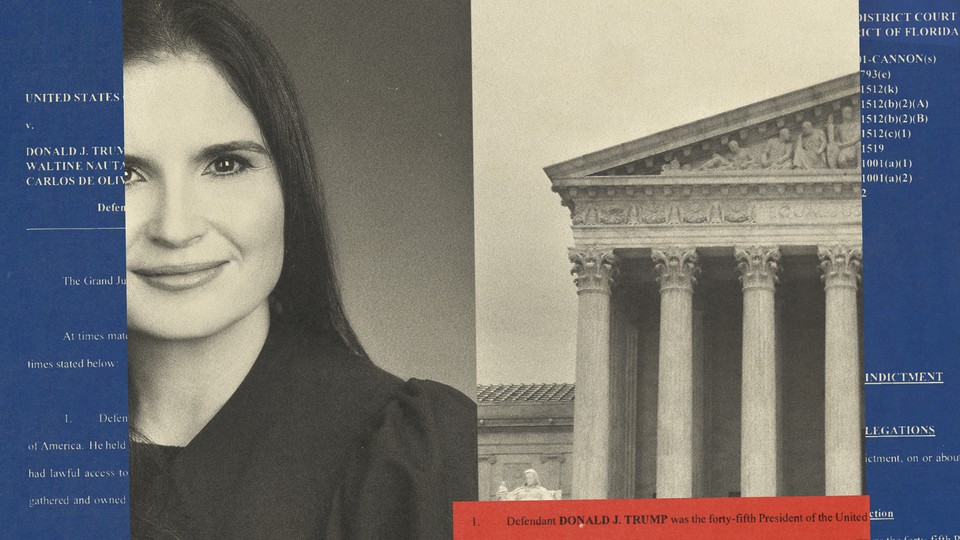Judge Cannon Has Gotten It Completely Wrong
4 min read
Judge Aileen Cannon, a Donald Trump appointee, has dismissed the criminal charges against the former president. On the merits, her opinion is a poor one, ignoring history and precedent. It will almost certainly be reversed on appeal. Even so, her actions will surely delay Trump’s trial and may even prevent it completely, should Trump return to power and dismiss the case before a verdict is reached. For these reasons alone, her decision is certainly notable.
But Cannon’s opinion is even more significant for what it says systematically about the American judiciary and its increasing hubris. Donald Trump is famous for saying that he “alone can fix” the nation. Judges now routinely say that they “alone” know what the law is or should be. Cannon is just the latest, perhaps most egregious, example.
The legal issue in question was the validity of Special Counsel Jack Smith’s appointment by the attorney general. Cannon determined that the appointment was invalid because, in her view, no statutory authority existed for the attorney general to create such an officer. According to her, Smith was an “inferior officer” whose appointment could be approved only if there was specific statutory authority; absent that authority (as she characterized it), the appointment was unconstitutional.
One could write a volume about how wrong Cannon’s analysis is, and no doubt many will do so (including Smith on his inevitable appeal to the Eleventh Circuit). On the statutory merits, for example, the law allows the “Attorney General [to] appoint officials … to detect and prosecute crimes against the United States [and] to conduct such other investigations regarding official matters under the control of the Department of Justice and the Department of State as may be directed by the Attorney General.” This clear language is discarded by Cannon on the borderline-frivolous ground that Smith is sometimes called an “officer” of the Justice Department rather than an “official.”
Worse yet, in her hubris, Cannon disregards both history and precedent.
As to history, the first special counsel ever was appointed during the Grant administration to investigate the Whiskey Ring scandal. Since then, literally dozens of special counsels have been designated by the attorneys general, including those investigating Watergate, and, most recently, by Trump’s own Department of Justice, which appointed Robert Mueller during Trump’s term in office. It takes quite a bit of self-regard to ignore more than 150 years of practical history.
As to precedent, during the investigation of Richard Nixon, the Supreme Court explicitly acknowledged the power of the attorney general: “Under the authority of Art. II, § 2, Congress has vested in the Attorney General the power to conduct the criminal litigation of the United States Government … It has also vested in him the power to appoint subordinate officers to assist him in the discharge of his duties.”
Cannon casually tosses that off as dicta—statements of the Court not necessary to the Court’s decision. She’s wrong; the special prosecutor’s authority to subpoena Nixon was at issue, and the authority was dependent on prosecutors’ very existence. But even if she were correct, it takes significant hubris to disregard the Supreme Court when you are a lower-court judge. It takes even more hubris to ignore (as Cannon did) definitive holdings from other courts (such as the D.C. Circuit’s decision to uphold the appointment of Special Counsel Mueller) on the grounds that they misunderstood the law and made a mistake in not realizing that the Supreme Court had spoken only in dicta.
The greatest hallmark of judicial humility is the doctrine of stare decisis. Often thought of as a rule about maintaining settled expectations, it is also a rule about humbleness—about the possibility that other jurists who’ve come before you had an equally well-informed appreciation for the law. Their errors (if errors they were) are typically not so far outside the limits of intellectual integrity as to be unacceptable and deserving of respect.
But that sort of humility is exactly what Cannon has failed to exhibit. Her rejection of 150 years of history and the considered judgment of other courts is the paradigmatic example of a jurist substituting her own judgment for that of an earlier era.
Much like Ángel Hernández (the infamous, recently retired umpire who never acknowledged his errors), Cannon simply refuses to allow for the possibility that her own views might be mistaken. In Hernández’s case, the consequences were modest—bad calls in a baseball game. With Cannon, the damage is far more significant. Not only did she get a major case wrong, but, far more important, her actions erode confidence in the legitimacy and independence of the judiciary.
Some months ago, another jurist who lacks humility, Supreme Court Justice Samuel Alito, complained that criticism of the judiciary on these grounds was deeply unfair. As he told The Wall Street Journal, “It goes without saying that everyone is free to express disagreement with our decisions and to criticize our reasoning as they see fit. But saying or implying that the court is becoming an illegitimate institution or questioning our integrity crosses an important line.”
A line has indeed been crossed—but it isn’t the line Alito imagines. It is the line of a politicized judiciary, without humility, without apparent concern for appearances, and without any real constraint. It is the line between a judiciary that serves the people of the nation and one that asserts the authority to command the people.



